Kaidan-eiga based on tales by Encho Sanyutei
The kaiden or ghost story told in Akira Nobuchi's Botan doro aka Kaidan botan-doro (Peonies & Stone Lanterns, 1955) is based on the classic Meiji era play by Encho Sanyutei (1839-1900), considered "the father of rokugo" or modern storytelling. The film also borrows from an 1898 short story version by Lafcadio Hearn well known in Japan as Koizumi Yagumo. Hearn's version can be found in his collection In Ghostly Japan.
A tryst between the young warrior Shinzaburo Hagiwara (Chiyonosuke Azuma) & beautiful Otsuya (Yuriko Tashiro) is discovered, & the shamed Otsuya commits suicide with her maid. Their ghosts subsequently appear to Shinzaburo
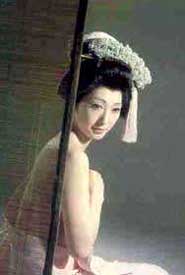 He obtains a door-protecting charm & a statue of the goddess Kannon from a priest to keep the spirits from his home. The conniving servant Tomozo removes the protective devices so that Otsuya can reach her lover & cart him away to the land of the dead. He obtains a door-protecting charm & a statue of the goddess Kannon from a priest to keep the spirits from his home. The conniving servant Tomozo removes the protective devices so that Otsuya can reach her lover & cart him away to the land of the dead.
This is one of the most often filmed ghost stories, second only to the more often filmed Yotsuya Ghost Story, versions dating to as early as 1910 & in every decade to follow as cinematic releases, direct-to-video releases, & television versions.
Itsumichi Isomura's Tokyo Ghost Story: Kiri no yoru, kanojo wa yattekuru (1990) updates the tale to take place in the rock music scene, with Aoyama Chikako as the beautiful ghost, & Sugimoto Tetsuta as the band manager who is the object of her desire.
A softcore or "pinku" version was Chusei Sone's Seidan botan doro or (Hellish Love aka Immortal Love, Nikkatsu, 1972) stars Setsuko Ogawa as Otsuya, shown in the photo above right. This film's poster is at the top of the page.
In this sexy version, an impoverished ronin is trying to make ends meet making umbrellas. He falls in love with a maiden & they do the sweet thing together quite a bit. She is killed by her father who disapproves of the match with such a lowly samurai, but she promises to return on Bon Odori to be reunited with her lover.
The young samurai attempts to save himself with talismans to keep the ghost-lover & her maid out, but the nosy neighbors are induced through bribery to remove the talismans, & the lovers are reunited.
One might expect such a sexed-up version to be seedy, but it has moody atmosphere with very pleasant cinematography.
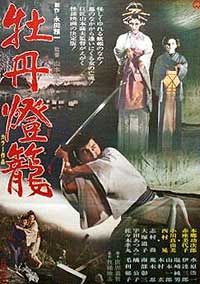 Satsuo Yamamoto's 1968 version of Kaidan botan doro was filmed for Daiei Studios. It is variously known as Bride from Hell aka Haunted Lantern aka Ghost Beauty aka My Bride is a Ghost aka Bride from Hades aka Peony Lanterns. Satsuo Yamamoto's 1968 version of Kaidan botan doro was filmed for Daiei Studios. It is variously known as Bride from Hell aka Haunted Lantern aka Ghost Beauty aka My Bride is a Ghost aka Bride from Hades aka Peony Lanterns.
A young man (Kojiro Hongo as Hagiwara Shinzaburo) flees an unwanted marriage with his brother's widow & lives quietly as a teacher some distance from his family.
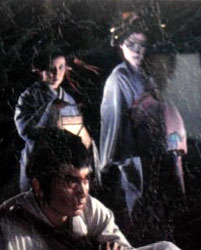 On Bon Odori, the summer festival of the dead, he meets a beautiful young woman (Michiko Otsuka) who he doesn't recognize as a ghost. But his interactions with her are leaving him weakened. Because she has a much more obviously ghostly attendant (Mayumi Ogawa), Shinza becomes frightened & visits Kiku the temple priest (Takashi Shimura) for an exorcism. On Bon Odori, the summer festival of the dead, he meets a beautiful young woman (Michiko Otsuka) who he doesn't recognize as a ghost. But his interactions with her are leaving him weakened. Because she has a much more obviously ghostly attendant (Mayumi Ogawa), Shinza becomes frightened & visits Kiku the temple priest (Takashi Shimura) for an exorcism.
During the exorcism the sorrowful ghosts tell of their tragic fate, & are truly pitiful. Our hero's own loneliness is so overwhelming due to his exile that he cannot resist a tryst with the beautiful spirit, to relieve both his & her pain.
The next morning, he's found dead on her grave, an ending that is treated as a happy ending or at worst bittersweet since they are united beyond the grave & need never again be lonesome.
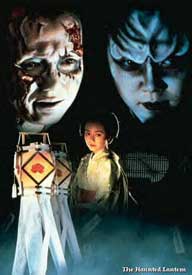 Masaru Tsushima's Otsuya: Kaidan botan doro (Haunted Lantern, 1996) is an old-fashioned film that feels like it could've been directed in the 1970s instead of the late '90s, with 70s-style "roman poruno" romantic sex sequences & exaggerated spurts of blood amidst a dead-serious poker-faced story. Masaru Tsushima's Otsuya: Kaidan botan doro (Haunted Lantern, 1996) is an old-fashioned film that feels like it could've been directed in the 1970s instead of the late '90s, with 70s-style "roman poruno" romantic sex sequences & exaggerated spurts of blood amidst a dead-serious poker-faced story.
Falling asleep at a shrine, Shinzaburo (Gitan Otsuru) dreams of a past life when he betrayed a brave woman with whom he promised to commit double suicide, but let her die alone. In his present life during the Edo period, he's a young samurai who would like to give up his swords & live as an art teacher, but has not done so because of his father's demanding wishes.
Along a country road Shinza rushes to the assistance of a young woman named Tsuyu (Yuuna Natsuo) whom he immediately senses he has known before, though they have never until then met in this life. Soonafter, Shinzaburo's father arranges a marriage between his son & a friend's daughter who turns out to be Tsuyu's younger sister Suzu (Juna Suzuki). Though Otsuya & Shinzaburo pine for one another due their karmic connection, neither reveals their true feelings.
Shinzaburo's friend (Tsuyoshi Ujiki) has also fallen for Otsuya & attempts rather too aggressively to have his way with her, telling her Shinzaburo put him up to the attempted rape so that she would stop being a nuisance jealous of her younger sister. Believing this lie, Otsuya attempts suicide, but her sister stops her, though they end up committing suicide together.
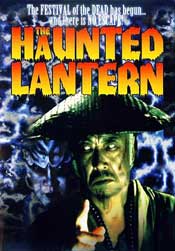 That night, a paper lantern on which Shinzaburo had previously painted peony blossoms is seen floating through the town to Shinzaburo's house. He is awakened by a call at the door, & lets the two sisters in. He does not recognize them as ghosts & does not know they have killed themselves. Suzu forgives Shinzaburo for not revealing that he actually loved her sister, & wishes him & Otsuya to always be together. Shinza pledges his life to Otsuya by writing in blood on rice paper, which Otsuya tears into pieces & swallows, so that they are "more than married." That night, a paper lantern on which Shinzaburo had previously painted peony blossoms is seen floating through the town to Shinzaburo's house. He is awakened by a call at the door, & lets the two sisters in. He does not recognize them as ghosts & does not know they have killed themselves. Suzu forgives Shinzaburo for not revealing that he actually loved her sister, & wishes him & Otsuya to always be together. Shinza pledges his life to Otsuya by writing in blood on rice paper, which Otsuya tears into pieces & swallows, so that they are "more than married."
Nightly the ghost women visit Shinza & he lays with Otsuya. By day he sleeps, & maggots are attracted to his body due to the stink of death. His friend realizes demonesses are nightly visiting Shinza, & that he is growing weaker every day. A blind priest (Akaji Maro) is elicited to protect the young samurai with incantations, charms, & prayers.
Feeling betrayed Otsuya & her sister become demonic indeed, though still acting only out of love so that there is a sorrowfulness to even their scariest aspects. They are empowered on the nights of the Bon Odori ghost festival, & the priest must struggle through four nights if there is to be any chance of saving Shinzaburo.
There is a short epilogue that shows the lovers in another incarnation in the modern world, & this closing touch lends a moment of originality that surprised me & I quite liked.
If some of the ghost make-up & flying FX hadn't been so silly, this could've been a great film, as it treats the familiar tale in a stylish old-fashioned manner that is very appealing. But the story has been filmed beautifully so often that a version in which flying ghosts shoot into the sky like rocket ships then dangle from wires causes grins where chills were intended.
It is nevertheless a seriously acted out & pleasant enough version of the hoary romantic tale of the haunted peony lantern, & it's at present one of the more easily obtained versions. I watched the dvd with English subtitles, as acting nuances are always lost in dubbed versions of Japanese films, & the language is beautiful. But I listened to about five minutes of the alternate track with English dubbing, & it won't seem harmful to viewers who don't like subtitles or who can tolerate dubbing in the first place.
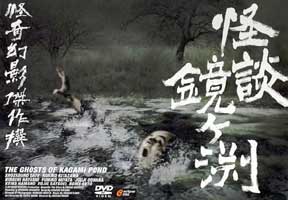 There are several other films based on other ghost stories of Encho Sanyutei, including his most often filmed Kaidan Kasane-ga-fuchi (Ghost Story of Kasane Swamp) with versions from 1926, 1930, 1957, 1959, 1960, 1968 & 1970. There are several other films based on other ghost stories of Encho Sanyutei, including his most often filmed Kaidan Kasane-ga-fuchi (Ghost Story of Kasane Swamp) with versions from 1926, 1930, 1957, 1959, 1960, 1968 & 1970.
Yet another is Kaidan Kagami-ga-fuchi (Ghosts of Kagami Pond aka Depth of Kagami, Shin Toho, 1959, illustrated near this paragraph) directed by Masaki Mori & starring Shozaburo Date, Noriko Kitazawa, Hiroshi Hayashi, & Fumio Mayata.
It regards a murderous store manager Kinbei who has discarded a girl's corpse in Kagami Pond, where Kinbei's fate & a ghost's revenge will eventually destroy him. This short sixty-one minute film was issued to commemorate the 60th anniversary of the author's death.
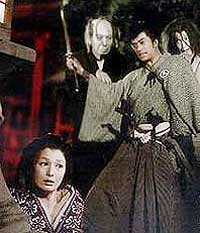 Inspired by the same author's hand was Kanenori Yamada's Kaidan chibusa enoki (Ghost Story of the Mother Tree, 1939) which had previously been filmed at the start of the silent era (in 1910), & was made again by Goro Kitano under the same title Kaidan chibusa enoki (The Mother Tree, 1958). Inspired by the same author's hand was Kanenori Yamada's Kaidan chibusa enoki (Ghost Story of the Mother Tree, 1939) which had previously been filmed at the start of the silent era (in 1910), & was made again by Goro Kitano under the same title Kaidan chibusa enoki (The Mother Tree, 1958).
This last is one of the strangest of Japanese ghost stories. A ronin, Isogai, becomes a painter's apprentice, but falls in love with the man's wife.
So he kills the painter & takes the wife, but she falls ill with a bizarre breast tumor that generates little birds, while the ghost of the painter, through his five year old son, is avenged upon the ronin.
The cast includes Akira Nakamura, Hiroshi Hayashi, Katsuko Wakasugi, Yataro Kitagami, Jun Tazaki, Achako Hanabishi, Machiko Mizuhara, & Michiko Saga.
copyright © by Paghat the Ratgirl
|
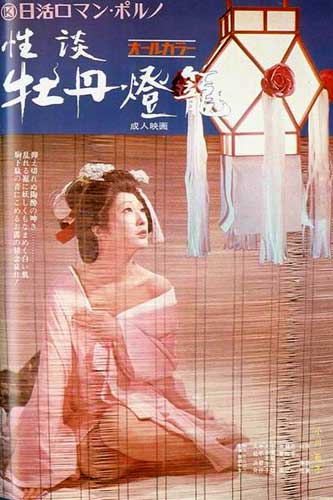
 He obtains a door-protecting charm & a statue of the goddess Kannon from a priest to keep the spirits from his home. The conniving servant Tomozo removes the protective devices so that Otsuya can reach her lover & cart him away to the land of the dead.
He obtains a door-protecting charm & a statue of the goddess Kannon from a priest to keep the spirits from his home. The conniving servant Tomozo removes the protective devices so that Otsuya can reach her lover & cart him away to the land of the dead.
 On Bon Odori, the summer festival of the dead, he meets a beautiful young woman (Michiko Otsuka) who he doesn't recognize as a ghost. But his interactions with her are leaving him weakened. Because she has a much more obviously ghostly attendant (Mayumi Ogawa), Shinza becomes frightened & visits Kiku the temple priest (Takashi Shimura) for an exorcism.
On Bon Odori, the summer festival of the dead, he meets a beautiful young woman (Michiko Otsuka) who he doesn't recognize as a ghost. But his interactions with her are leaving him weakened. Because she has a much more obviously ghostly attendant (Mayumi Ogawa), Shinza becomes frightened & visits Kiku the temple priest (Takashi Shimura) for an exorcism.
 That night, a paper lantern on which Shinzaburo had previously painted peony blossoms is seen floating through the town to Shinzaburo's house. He is awakened by a call at the door, & lets the two sisters in. He does not recognize them as ghosts & does not know they have killed themselves. Suzu forgives Shinzaburo for not revealing that he actually loved her sister, & wishes him & Otsuya to always be together. Shinza pledges his life to Otsuya by writing in blood on rice paper, which Otsuya tears into pieces & swallows, so that they are "more than married."
That night, a paper lantern on which Shinzaburo had previously painted peony blossoms is seen floating through the town to Shinzaburo's house. He is awakened by a call at the door, & lets the two sisters in. He does not recognize them as ghosts & does not know they have killed themselves. Suzu forgives Shinzaburo for not revealing that he actually loved her sister, & wishes him & Otsuya to always be together. Shinza pledges his life to Otsuya by writing in blood on rice paper, which Otsuya tears into pieces & swallows, so that they are "more than married."
